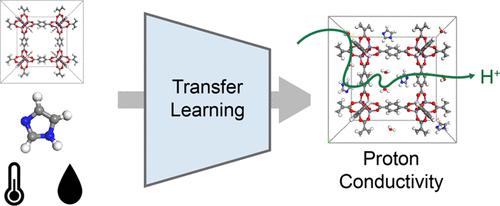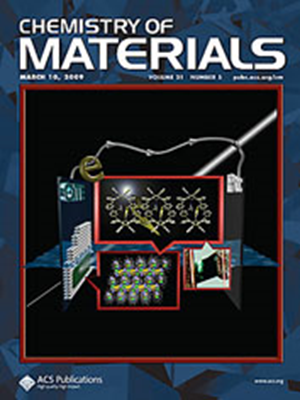Machine Learning-Based Prediction of Proton Conductivity in Metal–Organic Frameworks
IF 7.2
2区 材料科学
Q2 CHEMISTRY, PHYSICAL
引用次数: 0
Abstract
Recently, metal–organic frameworks (MOFs) have demonstrated their potential as solid-state electrolytes in proton exchanged membrane fuel cells. However, the number of MOFs reported to exhibit proton conductivity remains limited, and the mechanisms underlying this phenomenon have not been fully elucidated, complicating the design of proton-conductive MOFs. In response, we developed a comprehensive database of proton-conductive MOFs and applied machine learning techniques to predict their proton conductivity. Our approach included the construction of both descriptor-based and transformer-based models. Notably, the transformer-based transfer learning (Freeze) model performed the best with a mean absolute error (MAE) of 0.91, suggesting that the proton conductivity of MOFs can be estimated within 1 order of magnitude using this model. Additionally, we employed feature importance and principal component analysis to explore the factors influencing the proton conductivity. The insights gained from our database and machine learning model are expected to facilitate the targeted design of proton-conductive MOFs.

基于机器学习的金属有机框架质子传导性预测
最近,金属有机框架(MOFs)显示出其作为质子交换膜燃料电池固态电解质的潜力。然而,据报道表现出质子传导性的 MOFs 数量仍然有限,而且这种现象的内在机理尚未完全阐明,这使得质子传导性 MOFs 的设计变得更加复杂。为此,我们开发了一个全面的质子传导 MOFs 数据库,并应用机器学习技术预测它们的质子传导性。我们的方法包括构建基于描述符的模型和基于转换器的模型。值得注意的是,基于转换器的迁移学习(Freeze)模型表现最佳,平均绝对误差(MAE)为 0.91,这表明使用该模型可以在 1 个数量级内估算出 MOF 的质子电导率。此外,我们还采用了特征重要性和主成分分析来探索质子电导率的影响因素。从我们的数据库和机器学习模型中获得的启示有望促进质子传导 MOFs 的针对性设计。
本文章由计算机程序翻译,如有差异,请以英文原文为准。
求助全文
约1分钟内获得全文
求助全文
来源期刊

Chemistry of Materials
工程技术-材料科学:综合
CiteScore
14.10
自引率
5.80%
发文量
929
审稿时长
1.5 months
期刊介绍:
The journal Chemistry of Materials focuses on publishing original research at the intersection of materials science and chemistry. The studies published in the journal involve chemistry as a prominent component and explore topics such as the design, synthesis, characterization, processing, understanding, and application of functional or potentially functional materials. The journal covers various areas of interest, including inorganic and organic solid-state chemistry, nanomaterials, biomaterials, thin films and polymers, and composite/hybrid materials. The journal particularly seeks papers that highlight the creation or development of innovative materials with novel optical, electrical, magnetic, catalytic, or mechanical properties. It is essential that manuscripts on these topics have a primary focus on the chemistry of materials and represent a significant advancement compared to prior research. Before external reviews are sought, submitted manuscripts undergo a review process by a minimum of two editors to ensure their appropriateness for the journal and the presence of sufficient evidence of a significant advance that will be of broad interest to the materials chemistry community.
 求助内容:
求助内容: 应助结果提醒方式:
应助结果提醒方式:


